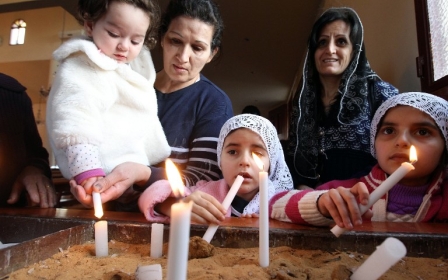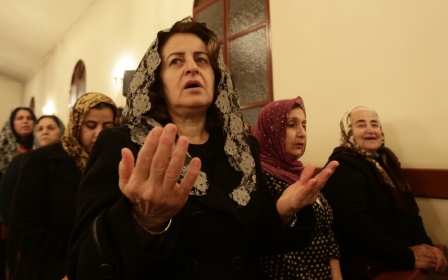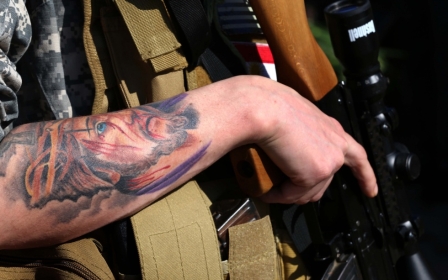Syrian Christians in Tel Tamer hold out against IS with Kurdish help
TEL TAMER, Northeastern Syria - David Jendo didn’t have much left - just a Bible, a gun and resolve. He cut a lonely figure in the Ekhaima, once the liveliest joint in Tel Tamer. From the middle of the dance floor, he took in the details of his old night haunt. The bottles of Arak had been stripped from the bar and the art deco-style windows were cracked and smeared with grime. But the stage where the bands used to play was still festooned with kitsch plastic foliage and bathed in a blue neon light.
“This place used to be packed, every night,” he said, looking round at the tables that were still set as if the customers would come back that evening. “There was music, and food, and alcohol and dancing. Everyone in Tel Tamer used to come here.”
Less than a fortnight had passed since the people had left, but the abandonment had already seeped into Tel Tamer’s bones. The soldiers who wandered around the empty streets, burly young men with heavy crucifixes around their necks, seemed like curious visitors in a model town – tourists who knew that what they were looking at might soon be gone. The official line was optimistic, but on the quiet the soldiers were candid.
“If IS [Islamic State] wants to take this town, it can,” said one. “We have a thousand men and light weapons. They can bring anything they need.”
The people left Tel Tamer on the day before Catholic Good Friday in April, packing their things into pickup trucks. They drive through the green velvet hues of a spring morning in the Syrian countryside until they reached safe houses in nearby cities. But David stayed. Even with IS closing in from three sides, he refused to leave his home.
“When the government left this area, the rebels said we were free,” he said, his honey-coloured eyes flashing under thick dark eyebrows. “But then the Islamists came, and the Arabs who had been our neighbours for thirty years turned against us within half an hour.” With his hunting rifle and the skills he learnt in his military service three decades ago, he joined a neighbourhood watch, determined that if IS came to Tel Tamer, he would be the last Christian to leave.
Three days later he was dead, killed in an IS ambush as he drove along the only road out of Tel Tamer. Still surrounded on three sides, the town continues to hold out against the odds – but nobody knows how much longer the current balance can last.
Revolution shakes Tel Tamer
Tel Tamer sums up much about the Christians’ position in northeast Syria. The largest town in the Khabur Valley, it sits at one end of a string of Assyrian Christian settlements running through the heart of Hassakeh Province, a poor rural region slotted between the Turkish and Iraqi borders. One of the most multicultural parts of Syria, it is a place where Kurds, Christians and Sunnis lived and worked together for decades before the outbreak of the conflict.
In Syria’s sectarian breakdown the Christians - around 10 percent of the pre-war population - are usually considered to side with the government. But in Hassakeh they are cut off - both physically and socially - from the large and metropolitan Christian communities in the government heartlands of Damascus and western Aleppo. While President Bashar al-Assad claims to be the man who will protect Syria’s minorities, many people here have long lost faith in his will or ability to do so.
In early 2013, the Assyrian Christians of Hassakeh founded their own opposition militia - the Syriac Military Council. Many of its members, like Kino Gabriel, an articulate former dental student who is now the militia’s spokesman, had taken part in anti-government demonstrations in 2011 and felt themselves part of the mainstream opposition movement.
Within a year, however, they said that they had been shunted out as the rebel became hijacked by what the Christian say were Islamist interests.
“The Syrian National Coalition (Syria’s Istanbul-based political opposition) can’t support the rights of all the groups in Syria,” said Kino. “We tried several times to work with other opposition groups, but most have a mentality that they can’t accept diversity within Syria.”
Then in early 2014, with few places left to turn, the Syriac Military Council formed an alliance with the Kurdish People’s Protection Units (YPG) which tend to be well trained militarily, but are also considered one of the only multicultural and moderate opposition elements in Syria today.
With IS gathering strength in northern Syria and starting to threaten both Kurdish and Christian interests, it was a deal that made sense - especially for the Christians, who suspected they would be prime targets once the IS assault came.
Islamic State assault
In late February, that assault came. IS stormed into the Khabur Valley, seizing a clutch of villages and abducting hundreds of civilians in an early morning blitzkrieg. Those who were not taken by the militants fled in a frantic exodus with IS shooting at their backs as they ran. Like the Yazidis in the Sinjar mountains and the Kurds in Kobani before them, the Assyrians of Khabur were under attack.
“We have felt the threat for the past three years,” said Samir Eliya Ketsho. He had moved his family from Tel Tamer to Qamishli, a town right on the Turkish border, where his family now lived in a sparsely furnished apartment watched over by a huge painting of Christ. “In Khabur, we are a small circle and we are surrounded by a larger circle of Arabs - and almost all of them support IS. So all of our young men have avoided military service and stayed to fight here, to defend their homes,” Ketsho said.
Together, the YPG and the Syriac Military Council have pushed IS back from some of Khabur after several weeks of fighting. While their position remains precarious, their alliance is holding.
It does so despite various contradictions that are inherent in the relationship. The Syriac Military Council started out as a staunchly anti-government militia, and its leaders insist that its views have not changed.
The YPG, though, has never openly opposed Assad, and has, at times, fought directly against the Free Syrian Army – once the would-be allies of the Syriac Military Council.
Now, the Christians, the Kurds and the government coexist in an uneasy harmony in Hassakeh Province, alongside numerous Sunni tribal militias and the National Defence Forces (neighbourhood militias armed and funded by the government). Even before international airstrikes began pounding the area last summer, the political patchwork here was one of the most tangled in Syria.
Caught in the middle
The civilians find their own ways to negotiate it. Aziz, a taxi driver and a family man who drives journalists around Rojava - the de facto autonomous Kurdish region in northern and north-eastern Syria - has decked out his minivan with an unlikely collection of trinkets. There is a cuddly lion on the dashboard; a clutch of rosaries and crucifixes dangling from the rear view mirror; ostrich feathers and silk roses wedged into the plastic sunroof surround; and, scattered around the edges of the windscreen, various pictures of Jesus. A small wax figurine of the Virgin Mary stands in the coffee cup holder. It is, without doubt, a Christian’s car.
At the government checkpoints, these ornaments are Aziz’s amulets. “They will not stop a Christian car,” said the translator, who goes under the nom-de-guerre of Murad. “We are not friends, but we’re not enemies either.”
On an unintended and unforeseen development, the Christians may yet achieve what they set out to do back at the beginning of the revolution - live in a Syria free of Assad and his government. With only a handful of checkpoints and bases left in the region, government forces have effectively handed power over to the Kurds here. Even if Assad’s government does not fall, in the long term, their prospects here look grim. If the Kurds have their way, north-eastern Syria will become an autonomous and self-governed Kurdish region. What that government might look like, though - and what role the Christians might play in it - is not yet clear.
“The agreement between us and the Kurds has happened in a transitional period,” said Kino Gabriel. “We have agreed to fight together. Now we have to agree to live together.”
New MEE newsletter: Jerusalem Dispatch
Sign up to get the latest insights and analysis on Israel-Palestine, alongside Turkey Unpacked and other MEE newsletters
Middle East Eye delivers independent and unrivalled coverage and analysis of the Middle East, North Africa and beyond. To learn more about republishing this content and the associated fees, please fill out this form. More about MEE can be found here.






